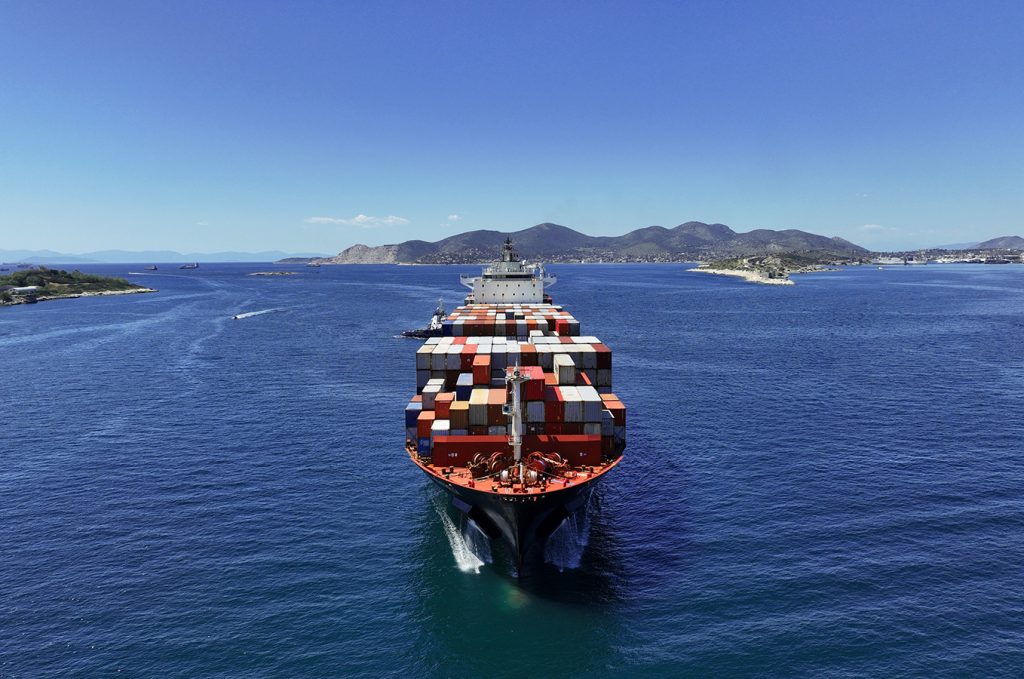
Lowering climate-harming emissions in maritime shipping
A new international consortium with maritime industry stakeholders, Center for Ocean Engineering, and IDSS will explore data-powered strategies to reduce harmful emissions, including optimizing vessel operations, finding alternative fuel sources, improving extreme weather prediction, and developing new ship designs.
Every day, tens of thousands of commercial ships — including some of the largest machines made by humans — are responsible for the movement of goods that power the global economy. These ships, and the ports that service them, use massive amounts of energy to transport all this cargo, making the maritime shipping sector a significant contributor of greenhouse gas emissions.
Decarbonizing a global sector like maritime transport requires multiple approaches working simultaneously, with both short-term and long-term planning, and international cooperation to implement systemic changes. A new Institute for Data, Systems, and Society (IDSS) research collaboration with the Center for Ocean Engineering and Mechanical Engineering, MIT SeaGrant, and both national and international shipping stakeholders will launch multiple research projects addressing climate-harming emissions in the maritime shipping industry. These projects tackle the challenge from a variety of angles, but are united by cutting-edge data analysis and computation techniques.
“Ship decarbonization presents several technological challenges that make it a complex and difficult problem on the interface of different scientific fields: ocean engineering and naval architecture, mechanical engineering, chemical engineering, nuclear engineering, material science, transportation and logistics, and, at the very core, data science and machine learning methods,” said IDSS director Fotini Christia, who co-leads the collaboration with MIT Mechanical Engineering professor Themis Sapsis, who directs MIT’s Center for Ocean Engineering. “As a hub for cross-disciplinary research addressing big challenges like climate change, IDSS is well-positioned to organize and support research in this area.”
Alternative fuel sources
One major locus of research is organized around getting fossil fuels out of ships altogether, an endeavor complicated by large energy needs and the diversity of vehicles that comprise the multi-national fleet. Essentially all of the energy used in maritime shipping has previously been oil based, but there are new and growing efforts to explore biofuels, ammonia and other low or zero-emissions fuels, and even nuclear technology.
While these fuel sources, scaled up in use, could offer huge reductions in carbon emissions, there are other trade-offs in health and safety that need careful consideration. Burning ammonia, for example, produces other pollutants that can have negative impacts on human health, according to research by IDSS and Earth, Atmospheric, and Planetary Sciences (EAPS) professor Noelle Selin.
“There is a potential for ammonia in shipping to be beneficial for both climate and air quality, but that requires that regulations be designed to address the entire range of potential impacts, including both climate and air quality,” said Selin.
Both retrofitting existing vessels and building a new global fleet powered by alternative fuel sources will take years, so researchers are exploring short-term strategies for lowering emissions in the meantime. But the impact of alternate fuel sources on refueling needs and port congestion also opens up new long-term possibilities for improving efficiency and further mitigating downstream environmental effects, especially to communities nearest seaports.
“Investing in ship decarbonization will significantly stimulate technological innovation in the shipping industry,” said Prof. Themis Sapsis, a Naval Architect by training and the director of MIT’s Center for Ocean Engineering. “This innovation will most certainly lead to the development of more efficient and sustainable propulsion systems, fuels, and operational practices.”
Pathways to decarbonization
With ambitious goals in emissions reduction being targeted by the International Maritime Organization for the next 10-15 years, multiple mitigation tactics will be required to meet them — especially considering the time still needed for designing and building new ships.
In addition to pursuing optimal implementation strategies for alternate fuel use, researchers within this new consortium will pursue topics such as:
- Machine learning methods for preventative maintenance and optimized ship logistics
- 3D printing and onboard manufacturing of spare parts
- Improved weather forecasting in a changing climate, especially for extreme weather events
- Data-driven algorithms for decreasing port congestion
- Hydrodynamic ship design
- Cybersecurity for marine vessels
“Organizations in this consortium will have the opportunity to join this conversation, highlight their specific needs and challenges, and have access to both ground-breaking research and the talented students who will go on to implement these kinds of changes,” said Christia.



